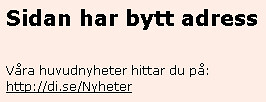What if in five years from now, millions of blogs are alive and kicking, producing sometimes great ideas and original content, often rubbish, but always with permanent links that in time creates an archive of great wealth, an archive of our culture, of the important events of our time? What if most of our search for information starts on Google or other search engines? What if traditional media continue to move old articles around, changing URL’s and locking them in closed archives, will that not be to their disadvantage? Search engines like Google like information on blogs and rank them high. Traditional media are in many ways losing ground in the search engine rankings and one reason is that articles often don’t have a permanent link.
Blogs have in some ways already changed the media landscape and turned what often is seen as a media monopoply on interpreting the world into a conversation. Bloggers comment on news articles and link to them, but when these links become dead ends simply because traditional media are moving stuff around in cyberspace, leaving resarchers and readers in the dark – the article can’t be found. Then the “media part” of the conversation is lost, and not much of a conversation is saved to the afterworld. Articles should be given a unique address that is there for infinity.
Of course, this has to do with business models that don’t include giving away something for nothing. But as stated in this Wired article about the New York Times, its lack of permanent links and closed archives:
When you think about it, the Times may have it backward. It charges $1 for the latest news in print, and offers it free over the Web, but for old material demands $3, which is three times the price of an entire newspaper.
A similar case in Sweden is the leading Swedish business daily Dagens Industri. Links to articles on its web site di.se, disappear soon after they have been published. A search on Google for a random word like “Tallinn” on di.se gives us only 11 hits, and the first article in the list (hit #5 in Google) is from April 2004, and it’s a dead link. This message is a common greating on di.se (“the page has changed address”):

Another example, searching for “riskkapitalister” (venture capitalists) on Google doesn’t show any articles from di.se among the top 200 hits, even though there are at least 28 articles on di.se during 2004 that contain that word. Dagens Industri, the premium source of business information, gets beaten by all other major media outlets and a bunch of blogs.
Simon Waldman, Director of Digital Publishing at the Guardian has written a brilliant article over at Jay Rosen’s PressThink about permanence. He writes:
All that reporting effort, all that insight and expertise, all those contacts: now completely invisible to the millions who decide to use Google as their first and final tool for researching.
He continues:
Without permanence you slip off the search engines. Without permanence, bold ideas like “news as conversation” fall away, because you’re shutting down the conversation before it has barely started. Without permanence, you might be on the web, but you’re certainly not part of it.
Here’s another example. Think of all the millions of words written by news organizations around the world about Abu Ghraib during 2004. Now go to Google and search (as suggested in the Wired article above) for Abu Ghraib, and you will find only a handful of traditional media outlets mentioned in the first few pages (fortunately, the Guardian is one). This isn’t just a quirk in Google’s search algorithm; this is about traditional media ceding responsibility for providing the definitive, permanent record of major events.
Surely there must be a business model that supports the idea of giving articles a permanent space on internet.